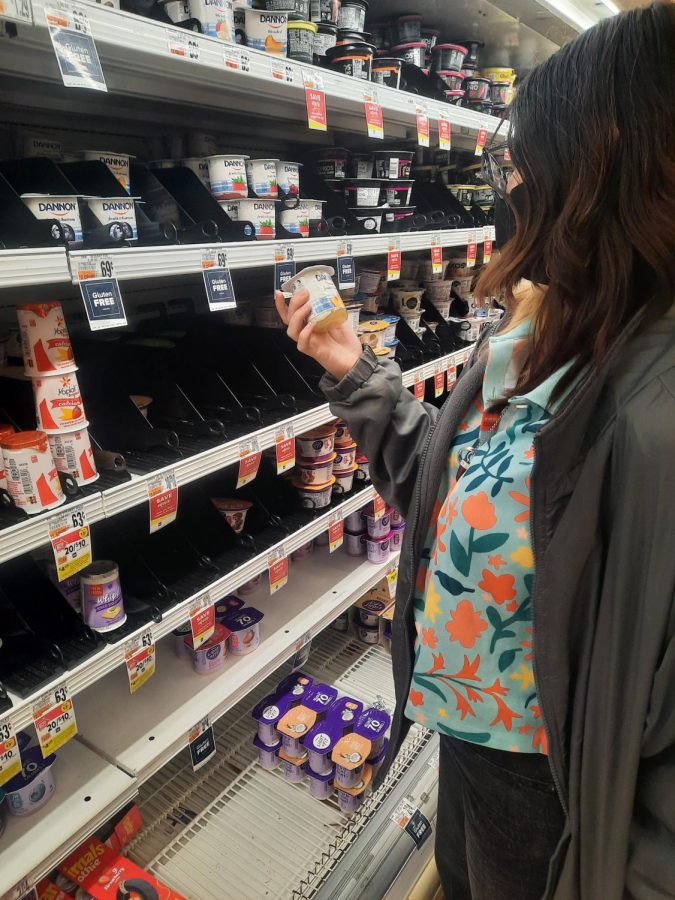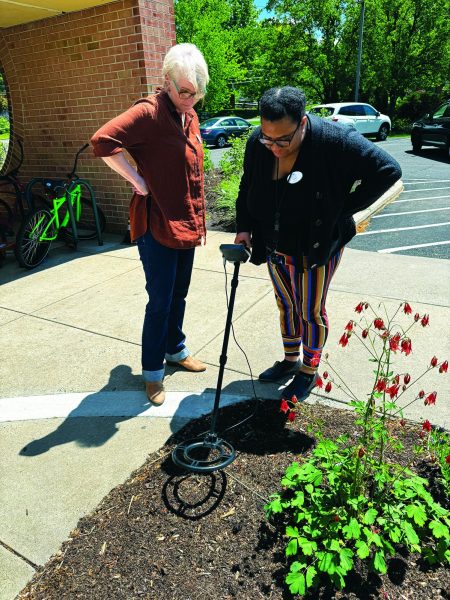Supply chain difficulties impact businesses, customers
Because of issues with supply and transport, both businesses and customers are facing complications with the shipment of goods. Businesses across the country are struggling to get their products shipped, both to their stores and to their customers.
Arrowhead photo by Melissa Brown
Struggling to shop…During an after school shopping trip to Giant Supermarket in Souderton, junior Ashley Caputo finds herself searching through barren aisles.
Due to supply chain problems, a variety of different establishments are finding it increasingly difficult to both receive goods and materials, and ship their products to their customers.
COVID-19 put a temporary stop to the production of many goods when quarantine first started.
Although places like factories are up and running again, there continues to be several issues along the supply chain.
There are shortages in a variety of products, ranging from electronics to supermarket goods, leaving many stores with empty shelves.
While there are some difficulties involving production, the problem mostly lies in transport.
According to Telford Press owner Scott Koffel, transportation has been a big problem for his business.
Koffel said that getting certain materials, such as paper, has continued to get more difficult.
“People just aren’t available to drop it off for the most part. That’s been the biggest problem,” Koffel said.
Koffel has also noticed supply issues outside of his own business.
“It’s grocery stores, it’s Walmart, it’s Home Depot,” Koffel said. “You normally would see shelves full, but [instead] it’s big blank spots.”
Koffel is not the only one to be facing shipping issues.
Arrowhead adviser Stacey Aronow said that the delivery of the newspaper’s autumn edition in October was delayed by a week due to the printing company’s inability to ship the newspaper initially.
“I’ve never had a shipping issue before,” Aronow said.
Aronow also said that these issues are a product of a lack of transportation.
“Companies like Amazon and FedEx and UPS are trying to hire, but they haven’t been able to hire enough,” Aronow said.
The unavailability of various products has also made prices increase, causing an even deeper impact on businesses and consumers.
Crist Farm Stand owner Nathan Crist said that despite growing a lot of his own products, the issues with supply have impacted his business too.
“Everything went up [in price],” Crist said. “Even the soil that we planted in went higher. The cost of all the fertilizer and everything went up.”
Bulk products and materials are not the only things affected by the problems with the supply chain.
Special education teacher Ruth Tashlein has been facing a struggle with delivery for months.
Tashlein said that her classroom’s television was not working properly just before the start of the school year.
The technology department ordered her a new one at the beginning of the school year, but it took an “unusually long” time to arrive.
Tashlein said that the delay was caused because her television was stuck on a transport vehicle for a while.
“They couldn’t get it off the ships. They were on a ship waiting to be offloaded,” Tashlein said.
According to a New York Times article written by Peter Goodman, there are shortages in “just about anything that is produced or manufactured.”
According to Goodman, COVID-19 seems to play a major role, making supply and demand “extremely volatile.”
However, Goodman also said that this is a factor that ties in with “decades of very lean inventories kept by companies” in order to save money.
Crist also said that past events are affecting some of the shortages that are occurring right now. “A Christmas tree takes anywhere from 8-12 years to fully grow,” Crist said. “Ten years ago, the economy was still struggling, and guys did not plant as many trees as they normally would, because they couldn’t afford it.”
According to Crist, the shortages lining up like this is “just bad luck.”







